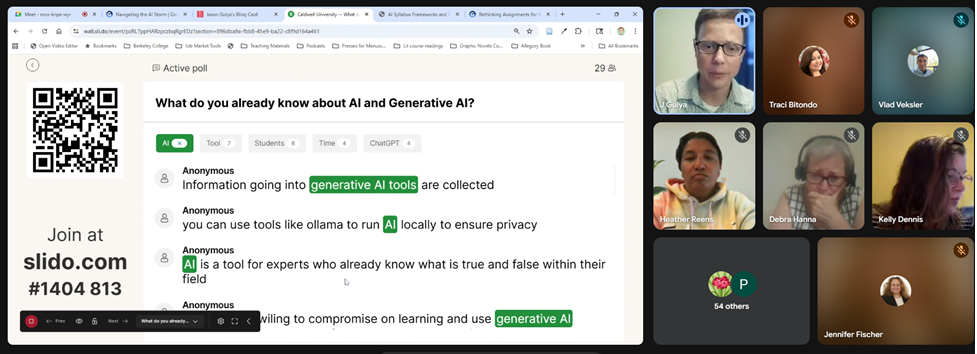Christine Horstman
September 1, 2025
Faculty Gain Practical AI Teaching Strategies at Caldwell University’s Annual All-Faculty Institute Workshop


Caldwell, NJ – Caldwell University faculty, joined by colleagues from Molloy University, gathered virtually on August 21, 2025, for a comprehensive three-hour professional development workshop titled “Navigating the AI Storm.” The event equipped educators with concrete strategies for teaching effectively in an increasingly AI-driven educational landscape.
“This was so valuable,” remarked Molloy’s Kelly Dennis. “Thank you to Caldwell for including Molloy in this. And Jason, you’re a phenomenal teacher in addition to giving us all this information.”
The workshop featured Jason Gulya, Professor of English and Media Communications at Berkeley College, Chair of the AI and Academic Integrity Committee, and a member of the AI Task Force. A sought-after consultant and keynote speaker on AI and the future of higher education, Gulya’s work has been featured in The Chronicle of Higher Education, Forbes, and Business Insider.
Addressing Real Faculty Concerns
Gulya focused on practical solutions to challenges faculty face daily. The session began with faculty sharing their existing knowledge about AI, revealing sophisticated understanding across disciplines—from concerns about hallucinations and factual errors to over-reliance on AI and cognitive debt, and recognition that AI tools are being heavily marketed to students.
Faculty grappled with fundamental questions about transactional rather than learning-focused education, student motivation, and the temptation to use AI as a shortcut rather than a learning tool. As one participant noted, there’s a growing concern that students “do not care about learning how to critically engage any longer” when AI can provide seemingly quick solutions.
Caldwell’s Catherine Monetti, a registered nurse with 40 years of experience, highlighted implications for healthcare education: “The implications in terms of the safety of people are really really severe… We’re going to have to rely on simulations and skills testing and critical thinking case studies and scenarios that the students are tested on a one-to-one basis because it’s really very serious.”
However, Gulya balanced these concerns with recognition of AI’s educational promise, citing research showing that AI designed with proper pedagogical frameworks can significantly improve student performance and retention. He emphasized that thoughtful implementation of AI tools could enhance rather than replace authentic learning experiences.
Concrete Strategies for Course Design
The workshop’s centerpiece was Gulya’s GEMS model for revamping assignments to discourage AI misuse while improving educational outcomes:
- Grounding assignments in specific class discussions or course frameworks
- Embedding AI tools purposefully within the learning process
- Multimedia components that require more complex skill sets
- Synchronous elements that allow real-time assessment
Participants worked through practical examples, transforming a basic research paper assignment into engaging alternatives like debates with AI chatbots, podcast creation, and peer teaching exercises.
Innovation in Assessment
One of the workshop’s highlights was the demonstration of custom-built AI chatbots designed to enhance learning rather than replace it. Gulya showed how students could debate controversial topics with AI opponents or teach AI “students” about complex subjects, with transcripts serving as authentic assessment tools.
“I have had students who have tried to use Grammarly to make their papers better and yet have used it with other AI things, which are in competition and ended up giving me so many errors in their papers,” shared Molloy’s Debra Hanna, illustrating the importance of teaching students to critically evaluate AI assistance.
Collaborative Learning and Alternative Assessment
Faculty participants shared successful strategies they’ve already implemented. Molloy’s Kathleen Lamaute, described assigning papers where students had to identify AI hallucinations and verify sources, noting that “they actually used the library more with this assignment than they ever did before.”
Caldwell’s Nicolette Salerno praised AI-embedded platforms in her psychology courses: “It’s pretty impressive… feedback that if I had to give them on a one-to-one basis with 25 students in the room would take hours… or they’re just not going to get in real-time.”
Building Community and Looking Forward
The workshop emphasized collaboration over competition in addressing AI challenges. Jennifer Fischer, Caldwell’s Chief AI Officer, invited participants to continue this dialogue through Caldwell’s community of practice around AI pedagogy, welcoming further collaboration with institutions like Molloy University.
“These are real things that are causing anxiety for people,” acknowledged Caldwell’s Vice President for Academic Affairs George Abaunza, who offered closing remarks. “Jason, you’ve given us so much on which to continue reflecting, but you have even more importantly provided us with concrete approaches by which to move forward in these uniquely challenging times.”
Lasting Impact
The workshop concluded with faculty expressing enthusiasm for implementing new strategies while maintaining focus on authentic learning. Participants addressed fundamental questions about curriculum and career preparation across disciplines, from healthcare workers to creative professionals, emphasizing the continued importance of critical thinking and creative thinking skills in an AI-enhanced world.
The event exemplified Caldwell University’s commitment to innovative pedagogy and collaborative professional development, providing faculty with practical tools to navigate the evolving educational landscape while maintaining academic integrity and authentic learning experiences. A recording of this rich and timely presentation will be available for playback, ensuring that colleagues who were unable to attend can continue to benefit from Gulya’s insights and strategies.
For more information about Caldwell University, visit www.caldwell.edu. The full playlist can be found online.


